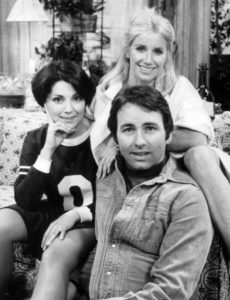
Decades may have passed since Three’s Company graced our screens, but its laughter still echoes in our hearts.
With unforgettable characters and side-splitting misunderstandings, this classic sitcom revolutionized the genre. Now, Joyce DeWitt reveals what really made the show a timeless treasure…

Public Domain
From the hilarious antics of three single roommates to the unforgettable performances of John Ritter and Suzanne Somers, Three’s Company remains a beloved staple of American television. It’s hard to believe it’s been 40 years since the series finale aired on ABC, yet its charm and humor still resonate today.
To illustrate how long ago Three’s Company became a hit, I just watched the intro. Seeing the shots from Santa Monica Pier during the show’s prime reminds me of how much has changed since they filmed there.
Sadly, neither John Ritter nor Suzanne Somers are with us anymore; both were taken from us far too soon. But keeping the spirit of Three’s Company alive is Joyce DeWitt, 75, who shares her vibrant stories and cherished memories from the beloved show.
”The most dear, precious, tender – and utterly unexpected – experiences that have come from working in ‘Three’s Company’ are the many, many adults who have told me that ‘Three’s Company’ was a safe haven they could count on during their teen years – for some, the only safe haven,” Joyce DeWitt told US Weekly.

Joyce DeWitt circa 1978. (Photo by Images Press/IMAGES/Getty Images)
Starring as Janet Wood alongside John Ritter and Suzanne Somers, DeWitt became a television icon and she was such a day brightener for millions.
She appeared in 171 episodes of the show between 1976 and 1984.
“It was such a gift. I mean, it was iconic. But who would have thought it?” Joyce DeWitt told The Spec. “All we were trying to do was make people laugh. When I think about it, the show was really an attempt to do a contemporary version of a 16th-century farce. It was about silliness running wild. I mean, we were talking about serious issues at times, but that was always somewhere underneath.”
“John Ritter used to say, ‘We don’t want people to just laugh but to fall over their couch laughing,’” she added. “The real issue was always the depth of friendship and the love those characters had for each other. That’s what drew people to them.”

Flickr
After Three’s Company ended, DeWitt stepped away from the spotlight for over a decade before making her comeback to acting.
Yet, no matter what she has accomplished or plans to do in the future, the vast majority will always connect her with that iconic show. And there’s a very simple reason for that, according to DeWitt.
“It was a ‘time out’ from the oppressive, challenging, difficult circumstances they were navigating in their young lives,” DeWitt says and adds:
“And, oh by the way, they say the characters also did stupid, crazy stuff that made them laugh. But it was the love, trust and support of the characters, one to the other, that made them lifelong fans.”

Public Domain
When you look at unedited photos from the Three’s Company set, the camaraderie among the cast shines through, especially in the images of Joyce DeWitt and Suzanne Somers, who played the beloved Chrissy Snow.
Both actresses delivered iconic performances, portraying young women navigating a male-dominated industry. They contributed just as much to the show’s success as John Ritter, and in those early days, their smiles in photos tell a story of friendship and collaboration.
Yet, beneath the laughter, tensions simmered. While Somers was celebrated for her role as “the dumbest blonde in America,” her fight for equal pay created rifts that would grow over time. As she demanded a 500% salary increase — from $30,000 to $150,000 — her relationship with DeWitt became strained. The set, once filled with joy, was now fraught with conflict.
Incredibly practical vintage tool with an obvious use for a particular job field

The Feeler Gauge Tool’s Legacy and Impact on Contemporary Tools
Precision measurement tools of today bear witness to the history of the antiquated feeler gauge instrument. The basic idea of measuring gaps with tiny blades has not altered, despite the increasing use of digital and electronic gauges. The feeler gauge has influenced modern tools, which aim to provide the same level of accuracy and dependability in their design and operation.

Collector’s Piece
Antique tool collectors and hobbyists now value vintage feeler gauges highly. These objects are prized for their historical relevance, quality craftsmanship, and robustness. Because they value the inventiveness and usefulness of early 20th-century engineering instruments, collectors frequently look for sets that have been preserved well.

Teaching Instrument
Moreover, vintage feeler gauges are instructional resources that shed light on the development of precision measurement. They are used to instruct students in the principles of mechanical measurement and the value of accuracy in engineering in technical schools and training programs.The history of precise measuring has been greatly influenced by the old-fashioned feeler gauge equipment. Its application across a range of industries, including manufacturing and the automobile industry, has guaranteed precise machinery assembly and maintenance. It still has an impact on contemporary tools today, and both educators and collectors cherish it. The feeler gauge’s legacy serves as a constant reminder of the value of accuracy and the long-lasting effects of straightforward yet efficient engineering solutions.



Leave a Reply